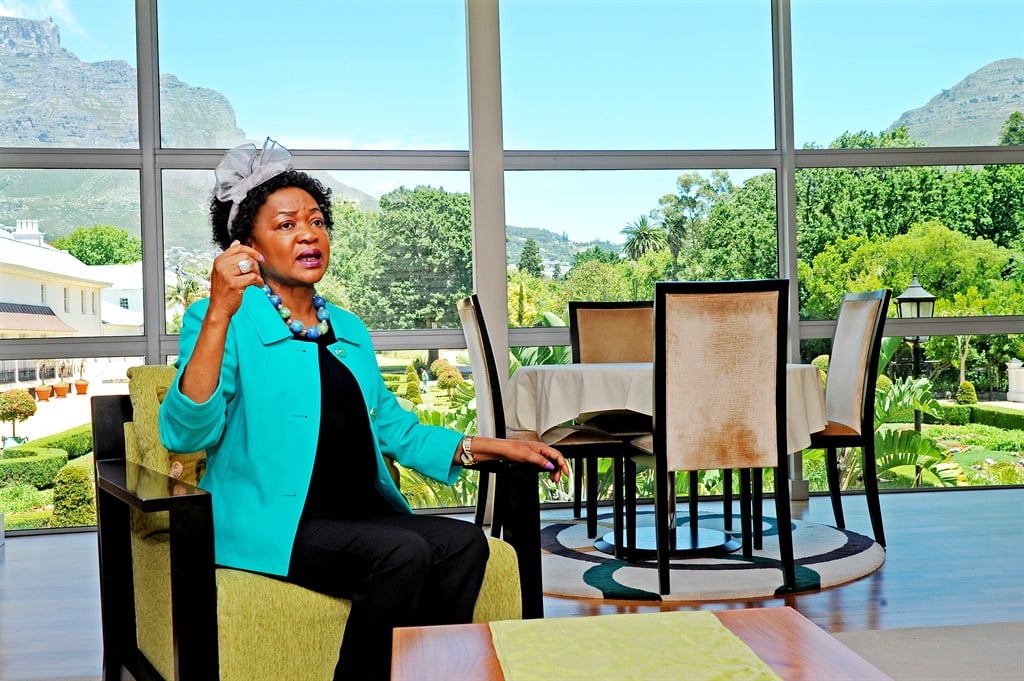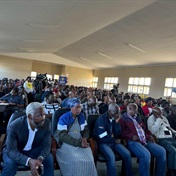
Speaker and ANC chairperson Baleka Mbete says she is relieved that Zimbabwean president Robert Mugabe chose to resign, rather than face the humiliation of being impeached.
Mbete was speaking to journalists on the sidelines of the launch of a report on Tuesday evening from a panel, led by former president Kgalema Motlanthe, that assessed the efficacy of South African legislation. The report was handed to Mbete.
“I am glad he decided to resign, that is what many of us who would like to remain respecting his legacy, respecting the role he played wanted,” Mbete said.
When Mbete was asked about the lessons for South Africa, she said: “Lessons for all of Africa is that, when the coffee is brewing, you need to smell it. That is all I want to say.”
Mbete has been accused of blocking attempts to impeach President Jacob Zuma.
The Economic Freedom Fighters launched a Constitutional Court application against her for not allowing Parliament to impeach Zuma, following a ruling by the same court in 2016 that Zuma had failed to uphold, defend and respect the Constitution.
Judgment in the case, supported by other opposition parties, has been reserved after arguments were heard in September.
Mugabe’s downfall has been hailed by his comrades in the ruling Zanu-PF and ordinary Zimbabweans, who poured out into the streets jubilantly. Mugabe, who has been at the helm since independence in 1980, tendered his surprise resignation as Zimbabwe’s parliament started the impeachment process against him on Tuesday.
It followed a decision by his party to recall him as leader.
The country that was once regarded as the food basket of Africa is facing an economic free fall that has forced hundreds of thousands of Zimbabweans to eke out a living in neighbouring countries and in the west. Motlanthe said Mugabe’s resignation was the “right thing to do”. “Running government at that age was quite taxing, for his own health and he had to give the country an opportunity to come under leadership that still has the energy ... so it was the right thing to do,” he said.
Earlier, when he started his address to the audience on the findings of the panel of experts report, he described the day as a special one “because of the earth-shattering events taking place next door, north of the Limpopo”.
He said there were no direct lessons for South Africa as its president was elected by Parliament, while Zimbabweans directly elected their president.
The army’s unexpected move to detain Mugabe was seen as an attempt to block his wife Grace from taking over the as president ahead of Zanu-PF’s elective conference in December.
She pushed for the firing of vice-president Emmerson Mnangagwa after leading a sustained public attack and insults against him.
Mbete praised the military, saying they were smart and responsible forcing Mugabe to see reason to step down. “The problem being faced there was not easy, because among the major challenges was that they were dealing with his wife. So they couldn’t be as rough as may have been required or the way she would have been,” Mbete said.
She said she was glad he saw reason and stepped down, she said. Mnangagwa is expected to be sworn in on Friday. – News24
By the Associated Press
Zimbabwe’s incoming president Emmerson Mnangagwa has spent years learning from Robert Mugabe.
Mugabe’s often violent seizure of Zimbabwe’s white-owned farms was his signature action – and devastated the country’s agricultural production.
His mismanagement of Zimbabwe’s economy was staggering. The country has been transformed from one that could offer good employment opportunities to its well-educated population to a place of so little hope that people left in droves. An estimated three million Zimbabweans are in South Africa, and it is routine to find a former schoolteacher working as a waitress at a Johannesburg restaurant. Tens of thousands of Zimbabweans are in Britain. And the 13 million who stayed behind in Zimbabwe have coped with an unemployment rate estimated at higher than 80%.
By 2008 Zimbabwe’s hyperinflation reached 500 billion percent, according to the International Monetary Fund.
Fistfuls of 100-trillion Zimbabwe dollar banknotes were not enough to buy basic groceries. The inflation was brought under control only when Zimbabwe dropped its currency and started operating on the US dollar in 2009.
Zimbabwe’s industrial sector is estimated to be operating at less than 30% of capacity. Tourism has dried up to a trickle.
With significant deposits of diamonds, platinum, gold and chrome, Zimbabwe’s mining sector has continued to function, but Mugabe’s frequent threats of nationalisation discouraged most foreign investment.
The Marange diamond fields, discovered in 2009, proved an unexpected windfall. The high-quality gemstones in easily exploited alluvial fields brought in billions of dollars.
Mugabe used the army to take over the area and the mines were nationalised, cutting out British and Chinese companies that had been operating there. But very little of the funds from the diamonds went into state coffers to help the country’s dilapidated education and health services. Mugabe, his family and his closest allies amassed world-class fortunes.
Once the land of liberation from white minority rule, Zimbabwe became one of fear as a result of Mugabe’s far-reaching domestic spy network, the Central Intelligence Organisation. Hundreds of opposition supporters were killed or disappeared during election campaigns. Many more were tortured, such as Jestina Mukoko, who after her release from prison bravely advocated for the rights of those detained.
It is hard to remember that Mugabe once enjoyed international praise for bringing Zimbabwe to independence. Throughout the 1970s he directed a deadly, effective guerrilla war against Rhodesia’s white minority rule regime. When he won the 1980 elections, he was relatively unknown. The country, and the world at large, was impressed by his impeccable, carefully enunciated Oxford English. He endorsed racial reconciliation to wide acclaim. He was nominated for a Nobel Peace Prize.
But even in the glory years of Zimbabwe’s early independence, Mugabe appeared cold and calculating in public appearances and speeches.
And then came the bloody campaign in which the army’s North Korean-trained Fifth Brigade brutally put down a small rebel group supporting opposition leader Joshua Nkomo. Between 1983 and 1985 an estimated 10 000 to 20 000 people of Zimbabwe’s Ndebele minority were killed by the army in southern Zimbabwe, in what is known as the Matabeleland Massacres. Human rights groups and the Catholic Church documented and condemned the killings, which remain the darkest stain on Mugabe’s record and a scar that plagues the country.
“Amnesty Lies International,” was how Mugabe dismissed a critical report by Amnesty International.
Mugabe family lavish ways
Tarnished by the killings, Mugabe was still grudgingly respected, especially for his support for the battle against apartheid, the system of white minority rule in neighbouring South Africa.
When Nelson Mandela was freed from prison in 1990, he quickly visited Zimbabwe to thank Mugabe for his support. But Mugabe came to resent Mandela, who outshone him.
When Mugabe married his second wife, Grace, in 1996, Mandela attended the reception. Mugabe glowered with irritation when Mandela got far more cheers from the thousands of guests than he did.
Mandela put forward a generous, inclusive view of African nationalism that won him international praise and a Nobel Peace Prize. Mugabe became a starkly different type of African leader, who marginalised critics and restricted freedoms. His homophobic outbursts against gays as “worse than pigs and dogs” contrasted with Mandela’s enthusiastic support for human rights.
Mugabe’s leadership became more like that of his one-time foe, Rhodesia’s white minority ruler Ian Smith. Mugabe used Rhodesian-era laws to suppress public gatherings and opposition parties. He used the army, the police and the security network to keep the people subservient.
An ascetic leader, Mugabe rarely drank and stayed spry into his 90s. But while his tastes had been relatively modest through the 1980s that changed after his marriage to Grace Mugabe. They built a 25-bedroom mansion on a sprawling property in Harare’s Borrowdale suburb that became known as the Blue Roof house for its turquoise tiles imported from China. Sporting designer clothes, shoes and sparkling jewels, the first lady, more than 40 years younger than Mugabe, became known as “Gucci Grace”
In the last months of Mugabe’s rule the family’s lavish ways became outlandish, even to Zimbabwe’s jaded public. Grace Mugabe pressed a lawsuit against a Lebanese diamond dealer in which she charged she had paid him for a 100-carat diamond but he only gave her a gem of 30 carats. One of the couple’s sons posted images on social media of himself pouring champagne over his diamond-encrusted watch.
The growing outrage among Zimbabweans at the excesses finally spilled over on Saturday, a few days after the military moved in to put Mugabe under house arrest, a the bulk of Harare’s 1.6 million people thronged the streets to demand that the longtime president finally step aside.
Mugabe’s rule may have been influential in Africa, but the quick way he fell now may be a warning to all who would follow his ways.




 Publications
Publications
 Partners
Partners








